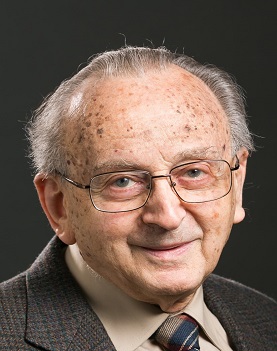
We write today to share the sad news that Peter Lengyel, PhD, professor emeritus of molecular biophysics and biochemistry, passed away on April 21, 2020. He was known for his tremendous recall and vast knowledge of science and all things cultural. Peter will be remembered for his kindness and generosity. The obituary below was prepared by his family, Bill Konigsberg, PhD, and Jeff Sklar, MD, PhD.
Sincerely,
Nancy J. Brown, MD
Jean and David W. Wallace Dean of Medicine
C.N.H. Long Professor of Internal Medicine
Mark Hochstrasser, PhD
Eugene Higgins Professor of Molecular Biophysics and Biochemistry
Professor of Molecular, Cellular, and Developmental Biology
~ ~ ~ ~ ~ ~ ~ ~ ~ ~ ~ ~ ~ ~ ~ ~
In Memoriam: Peter Lengyel, PhD
1929–2020
Peter Lengyel, PhD, died peacefully at his home in Woodbridge, Conn. on April 21, attended by his son Michael and his daughter Carole.
Peter Lengyel was a beloved colleague and a highly respected member in the Molecular Biophysics and Biochemistry department at Yale University. He was famous for his tremendous recall, vast knowledge of science and all things cultural, and his meticulous, precise, and fluent lectures delivered without notes, using only chalk and a blackboard to convey the most complex subjects.
Peter was born in Hungary in 1929, and studied at the Technical University of Budapest, graduating in 1951. After serving two years in the Hungarian army, he spent another two years as a graduate student at the same university. Along with his wife Suzanna—treasured by Peter and everyone who had the good fortune to encounter her great wit and warm personality—Peter departed for the U.S. in 1956, after the collapse of the Hungarian uprising against the Soviets. In America, Peter resumed his graduate studies at NYU under the direction of Dr. Severo Ochoa.
Peter’s PhD project involved deciphering the genetic code. He was not alone in this endeavor since Marshall Nirenberg at NIH and Har Gobind Khorana at British Columbia and later Wisconsin were working on the same problem. The competition among the labs was intense. Peter’s work resulted in the correct determination of the nucleotide composition of codons for 18 amino acids, which was published almost simultaneously with the work from the NIH. Peter’s outstanding achievement resulted in his being appointed as a faculty member at NYU, a position he accepted after another year of postdoctoral work with Jacques Monod in Paris. However, his stay on the NYU faculty was brief, as he was recruited by Alan Garen to the MB&B department at Yale in 1965. While at Yale, Peter made many important scientific contributions. Among them was the first demonstration that formylMet-tRNA was required for the translation of bacteriophage f2 RNA in a cell-free system.
Starting in 1972, Peter began investigating the interferon system where he, again, made a number of significant advances. Research from his laboratory led to the discovery, characterization, and naming of RNase L, an RNase activated by interferons as a defensive mechanism against infecting viruses. His interferon work drew him to another research area involving the protein p202, which acts as a regulator of transcription, and then to protein p204, which turned out to be a modulator of cell proliferation and differentiation. After 49 years in the MB&B department, Peter retired from the Yale faculty in 2014.
Peter’s enormous contributions to science did not go unrecognized as he received numerous prizes and honors for his work.
Peter will be remembered for the kindness and generosity with which he treated students, colleagues, and collaborators. His erudition, refined manner, polite friendliness, abundant curiosity, and sincere concern for others were among his defining features. We are grateful for having had a chance to know and work with him. His memory will be with us always.